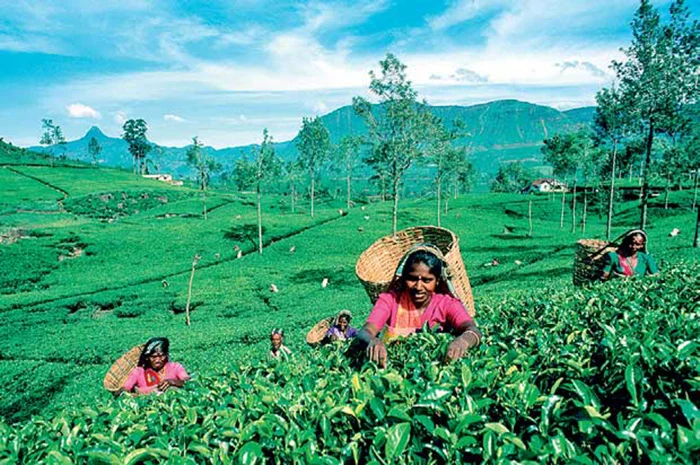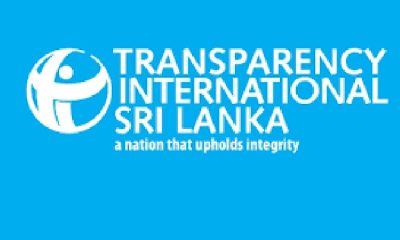Business
ComBank supported VTA graduates find gainful employment

The Commercial Bank of Ceylon has helped 210 school leavers find lucrative employment after completing Vocational Training Authority (VTA) training programmes and obtaining National Vocational Qualification (NVQ) certifications.
The Bank has been a part of the VTA’s initiative to train students who drop out of school after Grade 10 to equip them with skills necessary to thrive in the country’s construction industry since VTA first launched a specialised intervention titled ‘120 Days Training’ in 2015 to address the skills gap in the construction sector.
The programme entailed providing students with theoretical and hands-on training in the fields of masonry, carpentry, and plumbing. Trainees that successfully complete their 120-day course are awarded the NVQ Level 3 certificate. The syllabus also includes English language training specific to the construction industry, which would enable students to be eligible for foreign employment.
Commercial Bank supported the initiative between 2015 and 2020 by funding the resource personnel who conducted motivational training at these programmes and printing and providing training material pertaining to the course.
Further, in collaboration with the VTA the Bank also helped find employment opportunities for these students at reputed companies including Maga Engineering, Nawaloka Construction, Sripalie Construction, and Access Engineering with an entry level salary of Rs 50,000 upwards. Officials of the VTA and the CSR Unit of Commercial Bank met with the management of these companies on many occasions and requested them to persuade the new recruits to continue their pursuit of NVQ Levels four, five, and six and ultimately earn the seventh and last certification which is a Civil Engineering Degree offered at the University of Vocational Technology, Ratmalana.
Commenting on its role in VTA’s training initiative, Commercial Bank Managing Director Mr S. Renganathan said: “We recognise that the country’s labour force is one of the most important factors in development, irrespective of the sector. A skilled workforce is critically important to the construction industry and by supporting VTA’s programme we hope to contribute to the sector’s development while helping build young Sri Lankans find rewarding careers.”
He noted that most of the students belonging to the first batch that completed VTA’s 120 Day Training programme are now NVQ Level 5 certified professionals who pursued their training while at work. “It is heartening to note that if one is enthusiastic in this field, he or she can become a qualified and experienced Civil Engineer at the age of 23,” Mr Renganathan added.
Notably, the VTA programme is the only option available to those who leave school after Grade 10, to earn a Civil Engineering Degree or an equivalent, without going to university.
VTA was established in 1995 with the intent to provide skills for employment, especially to the rural masses of the country which constitutes 72% of the total population, and equip them with skills necessary to find employment opportunities both locally and internationally.
Sri Lanka’s first wholly carbon neutral bank, the first Sri Lankan bank to be listed among the Top 1000 Banks of the World and the only Sri Lankan bank to be so listed for 10 years consecutively, Commercial Bank operates a network of 268 branches and 932 automated machines in Sri Lanka. The Bank’s overseas operations encompass Bangladesh, where the Bank operates 19 outlets; Myanmar, where it has a Microfinance company in Nay Pyi Taw; and the Maldives, where the Bank has a fully-fledged Tier I Bank with a majority stake.
Business
India pledges $450 million for cyclone recovery while Sri Lanka’s top financial watchdog seat remains vacant

India extended a powerful hand of friendship on December 23, pledging $450 million to help Sri Lanka rebuild from Cyclone Ditwah. The aid, announced by Indian External Affairs Minister Dr. S. Jaishankar, is a lifeline for critical infrastructure, housing and agriculture.
Yet, even as this commitment was made, a crucial question hung in the air: Who will watch the money?
Sri Lanka has operated without a permanent Auditor General for eight months, an independent observer told The Island Financial Review.
“Since April 2025, the constitutional body meant to be the independent guardian of public spending has been led by temporary appointees. This isn’t just bureaucratic delay; it is a self-inflicted wound on democratic accountability,” he said.
He explained that the Auditor General, mandated by the Constitutional Council, is the linchpin that ensures public funds are used with integrity.
“In a nation still recovering from a devastating economic crisis, the AG’s role is the bedrock of trust. This office audits everything from social safety nets to state-owned enterprise losses and, critically, emergency expenditures,” he noted.
“The delay undermines public trust and robust oversight at a time when these are urgently needed. With no permanent AG, the oversight of billions in cyclone relief funds – including India’s generous package – can be fundamentally weakened.”
India’s decision to provide funds despite this oversight vacuum is a profound act of goodwill, the observer said.
“But the question now shifts squarely to the Sri Lankan government: How will it honour that faith? The $450 million is a mirror held up to Sri Lanka’s governance,” he stated.
He urged the Constitutional Council to act decisively to appoint a competent, independent Auditor General through a transparent process.
“This is the cornerstone of ensuring that disaster recovery builds not just physical infrastructure, but also public trust,” he concluded.
By Sanath Nanayakkare
Business
Robust overseas demand for Sri Lanka’s premier tea

Ceylon Tea exports have demonstrated notable volume growth for the first eleven months of 2025, reaching a cumulative total of 239.57 million kilograms. This figure represents a solid increase of 16.35 million kilograms compared to the corresponding period in 2024, signalling robust overseas demand for Sri Lanka’s premier commodity.
The broader trend, however, reveals a dynamic reshuffling among the nation’s key export markets, painting a picture of both promising diversification and shifting global trade currents.
A striking development is the continued ascendancy of Iraq as the single largest importer of Ceylon Tea. During the January to November period, Iraq purchased 36.77 million kilograms, marking a substantial 21% year-on-year increase and firmly securing its top position. In contrast, the traditional powerhouse market of Russia, while holding second place with 19.94 million kilograms, recorded a 13% decline in volume. Other markets show significant movement; Türkiye follows closely in third place, while Libya has emerged as a high-growth destination, witnessing a remarkable 115% surge in imports to claim fourth position. This evolving landscape underscores a strategic shift, where gains in emerging and regional markets are actively counterbalancing softer demand in some established ones.
Categories such as Instant Tea and Tea Bags have recorded encouraging gains in both volume and foreign exchange earnings, indicating a positive consumer trend towards convenience and value-added products. This gradual move up the value chain is crucial for enhancing the sector’s resilience and profitability.
Business
Sri Lanka to host South Asia’s inaugural Reggae festival in Bentota

Sri Lanka is poised to enter the regional cultural spotlight as the host of South Asia’s first-ever reggae music festival. “ONE LOVE 2026 – A Tribute to Bob Marley” will be held from 27 to 29 March 2026 on the beaches of Bentota, marking an unprecedented celebration of global reggae music within the Asia-Pacific region.
The landmark announcement was made at a press conference hosted by the ultra-luxury property, NUWA- City of Dreams in Colombo.
The festival represents a significant cultural and tourism initiative, featuring an unprecedented assembly of international reggae talent for the region. The confirmed lineup includes six globally acclaimed acts: Maxi Priest, The Wailers, Julian Marley & Ky-Mani Marley, Inner Circle and Big Mountain.
Organised by One In A Million Entertainment Ltd.—a Sri Lankan-owned firm with headquarters in Europe and Colombo – in strategic collaboration with Caribbean Entertainment, the event builds upon a proven track record of delivering major international entertainment to Sri Lanka. The festival is anticipated to attract thousands of attendees, including local enthusiasts and visitors from key markets such as India, the Maldives, and Bangladesh, as well as Western tourists seeking a tropical retreat.
Aligning with the commemoration of Bob Marley’s 81st birthday, the event carries profound cultural resonance. It also incorporates a charitable component, with a portion of proceeds dedicated to a children’s orphanage water purification project managed by the Indian Cultural Association in Sri Lanka, and to supporting the charitable activities of the Bob and Rita Marley Foundation in Jamaica.
The festival’s international delegation will be accommodated at NUWA Sri Lanka, the flagship ultra-luxury destination of Melco Resorts & Entertainment in Colombo.
Ticket Information: Daily General Admission: LKR 10,000, Daily VIP Admission: LKR 50,000, Early Bird Three-Day Festival Pass (Limited Offer):, General Admission: LKR 25,000, VIP Access: LKR 125,000 Tickets are available via the PickMe Events platform.
-

 News2 days ago
News2 days agoMembers of Lankan Community in Washington D.C. donates to ‘Rebuilding Sri Lanka’ Flood Relief Fund
-

 Business6 days ago
Business6 days agoUnlocking Sri Lanka’s hidden wealth: A $2 billion mineral opportunity awaits
-

 News6 days ago
News6 days agoArmy engineers set up new Nayaru emergency bridge
-

 News6 days ago
News6 days agoTISL, civil society flay NPP govt. for holding up Auditor General’s appointment
-

 Latest News7 days ago
Latest News7 days agoLevel III landslide early warnings issued to the districts of Kandy and Nuwara-Eliya
-

 Latest News5 days ago
Latest News5 days agoLandslide early warnings issued to the districts of Badulla, Kandy, Kurunegala, Matale and Nuwara-Eliya extended till 8AM on Sunday (21)
-

 Opinion6 days ago
Opinion6 days agoThe Maha Jana Handa at Nugegoda, cyclone destruction, and contenders positioning for power in post-NPP Sri Lanka – II
-

 Latest News6 days ago
Latest News6 days agoTannane goal from own half sets Morocco on way to FIFA Arab Cup 2025 title













